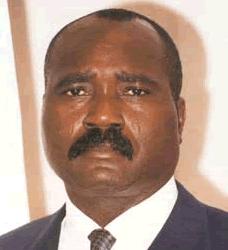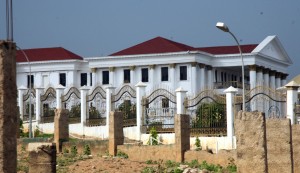15 April 2007
Location: Home, Benin City
Democracy Naija Style…or the “N” Factor
Today is tax day in the U.S. How smoothly that system seems to work, at least from this vantage point. I know that I have to pay taxes every year, and I have a general idea of how those taxes are used. Of course, there are certain things that I wish more of my tax dollars could be applied to: for instance, education and health care instead of increased militarization and the prison industrial complex. There are also those things my taxes pay for that I don’t think too much about in my day-to-day life in America, things that I take for granted: functioning roads, park maintenance, infrastructural upkeep of electricity and water supplies. Here in Nigeria, the only people who pay taxes are civil servants, and even in that sector, it is not consistent nor can it be tracked well by government due to disorganization, incompetence, and corruption (it is hard to enforce regular taxation when most civil servants don’t even get paid regularly).
Nigerians buy plots of land and put up houses without a thought of property tax. Driving through GRA (this acronym, a colonial hold-over meaning “Government Reserved Area,” when colonial officials segregated themselves from the African population), I often wonder at the incongruence of palatial homes lined up on unpaved pot-holed streets, littered with refuse because there is no such thing as a municipal waste management system. There is no property tax to regularly pay for these basic public needs.
The more fundamental question remains: who are the real tax-payers in Nigeria? The answer is quite simple: the multi-national oil companies. Shell, British Petroleum, Chevron, Texaco, and Agip are responsible for more than 80 percent of the national revenues. In exchange, the government supports and preserves their interests. These multinational companies can make claims on land, on military resources (for protection and for punishment, in the case of resistant communities…just think of Ken Saro-Wiwa and the Ogoni situation), and on special access to government contracts. These are the real taxpayers. If we regular citizens are not responsible for government revenue, we cannot expect that this government be accountable to us. It is that simple.
Today is the day after our federal elections here in Nigeria. Thankfully, there wasn’t too much violence, and things were relatively quiet here in Benin City. In fact, the streets were mostly deserted; most people stayed home, including me. As we watched the local news, we found that many voting centers opened very late, if they opened at all. Election workers had not shown up or the voters didn’t come. Some centers did not even have ballots. There are rumors circulating that over 60,000 ballots were still sitting in South Africa, the printers of our ballots. Supposedly the federal government paid for them, but requested they stay in South Africa. I hope this is just a rumor. A very small percentage of people turned out to vote. It would be a high guess if even 15% of the eligible voting public actually voted.
Days before the election, the government mobilized the army, posting them at all the major thoroughfares in the big cities. It felt very much like the military days of past years, in the 1980s. The tension has been high for the past couple of weeks, as many people scrambled to get to their hometowns to prepare for staying indoors. Aside from possible violence there was fear of a fuel hike, as well as soaring food prices. Thankfully things have remained fairly stable.
This whole election process has been surreal. It was only in December that the President- and Vice President-elect were even announced as candidates (very late in the game), and since then most of the other opponents have fallen away like ants on Raid. The governors’ races went the same route. They are going to announce Yar’Adua as our new president and Emmanuel Uduaghan as Delta State’s new Governor. For Edo State, even though the Labor Party’s candidate, Mr. Oshiomole is more popular, the PDP (People’s Democratic Party) candidate, Mr. Osunbor, will take the seat of Governor. The PDP has this thing wrapped up in most, if not all states, and even within the PDP there is a select hierarchy. There is no viable alternative party.
This was not a free election. People are afraid. And most of the people who ran for office have been recycled from past gluttonous, authoritarian regimes. It is a tragic comedy, the images of people queuing up to cast their votes, knowing that it really doesn’t matter.
April 20th
They’ve announced our president. As we’ve all known, the ruling PDP party took most governmental seats. Only Lagos and a couple of other states voted in other candidates (voter turn-out must have been higher in these states, or at least the resistance to the ruling Party was strong enough). In Benin, the women have been protesting for the past couple of days. They stormed the streets wearing black, protesting the PDP candidate, Mr. Oshiomole. The Labor Party candidate did not win the election, even though he was the favorite here in Benin. Today, more women will come out and expose themselves. This is a longstanding practice of protest among women in this part of the country. If a woman exposes herself (her privates) in protest, especially an old woman, it is considered a strong curse. In the midst of their protest, they also condemned the former governor, Lucky Igbinedion, one of the most corrupt governors of the former regime.
Lucky Igbinedion became governor of Edo State in 1999 under the newly formed PDP and new elected President (and former military dictator) Olusegun Obasanjo. Under Igbinedion’s watch, Benin became notorious for its contribution to the global sex trade, especially to Europe; the city’s infrastructure further deteriorated, and Benin continued to roil in an epidemic of armed robbery and thug violence. The people of Benin view him with absolute contempt and vitriol.
People are sick and tired of the political process, but I am always amazed at how much Nigerians can stretch themselves to accommodate this abuse of power. It is so excessive, and so obvious that it is almost a farce.
Postscript: In 2008 the Economic Financial Crimes Commission of Nigeria charged him with 142 counts of fraud and embezzlement, claiming he embezzled over $24 million of government funds. He was convicted of these crimes, but he never served any time, nor has this money been restored to the public coffers.

